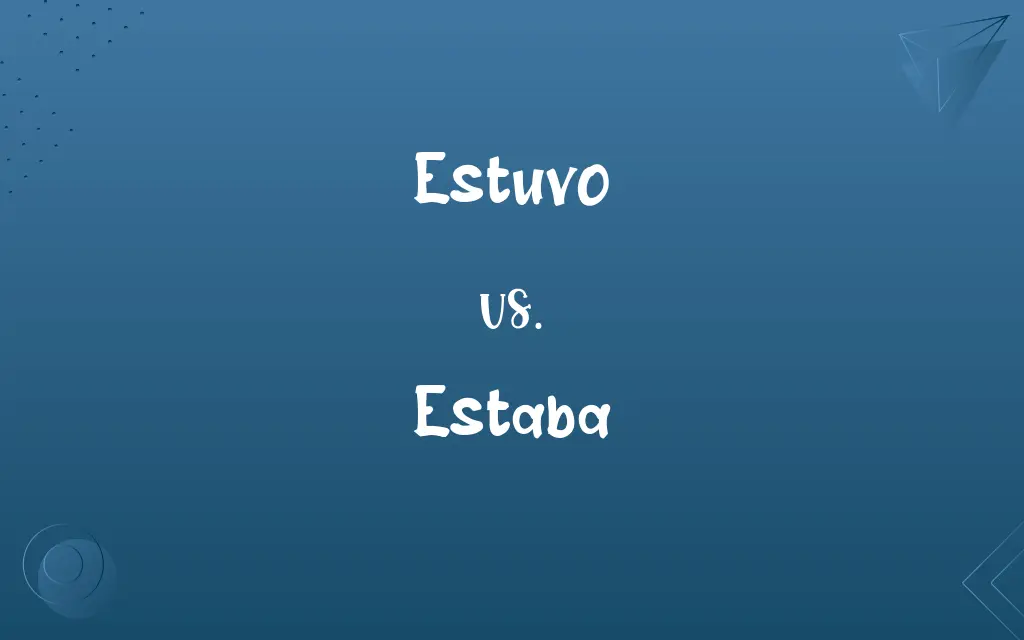Estuvo vs. Estaba: Know the Difference

By Shumaila Saeed || Published on February 13, 2024
Estuvo is the past tense of "estar" in Spanish for a completed action (preterite), while Estaba is used for ongoing or habitual past actions (imperfect).

Key Differences
The difference between "Estuvo" and "Estaba" in Spanish lies in the aspect and the tense of the verbs. "Estuvo" is the third person singular form of the verb "estar" in the preterite tense, which is used to describe actions that were completed at a specific point in the past. "Estaba," on the other hand, is the imperfect tense form of "estar," used for ongoing, habitual, or incomplete actions in the past. This distinction is crucial in Spanish as it changes the meaning and the context in which the verbs are used.
Shumaila Saeed
Feb 13, 2024
When using "Estuvo," the speaker typically refers to a specific, completed action or state. For example, "Él estuvo en la fiesta anoche" (He was at the party last night) implies that his presence at the party is a completed event. In contrast, "Estaba" suggests a continuing state or action in the past, without a defined beginning or end. For instance, "Él estaba en la fiesta cuando llegué" (He was at the party when I arrived) suggests he was already there and continued to be there for an unspecified duration.
Shumaila Saeed
Feb 13, 2024
In terms of nuance, "Estuvo" often implies a temporary state or action that has a clear end. This makes it suitable for narrating events in a story or reporting actions that occurred at specific times. "Estaba" is more appropriate for setting the scene, describing ongoing situations, or talking about habitual actions in the past. For example, "Cuando era niño, estaba siempre feliz" (When I was a child, I was always happy) indicates a habitual state over a period of time.
Shumaila Saeed
Feb 13, 2024
The choice between "Estuvo" and "Estaba" can also impact the emotional or interpretive meaning of a sentence. "Estuvo" might be used to emphasize the completion or significance of a past event, while "Estaba" could imply a sense of nostalgia or continuity. For example, "Estuvo enfermo ayer" (He was sick yesterday) focuses on the fact of being sick as a completed event, whereas "Estaba enfermo ayer" (He was sick yesterday) could imply he was sick throughout the day or that his being sick affected other events.
Shumaila Saeed
Feb 13, 2024
In summary, "Estuvo" and "Estaba" are both forms of the verb "estar" but are used in different contexts. "Estuvo" is used for specific, completed actions or states in the past, emphasizing the completion of an event. "Estaba," in contrast, is used for ongoing or habitual states or actions in the past, often conveying a sense of continuity or duration. Understanding the nuances between these two forms is essential for effectively communicating in Spanish.
Shumaila Saeed
Feb 13, 2024
ADVERTISEMENT
Comparison Chart
Interaction with Past
Marks an action before another past event
Describes a background action
Shumaila Saeed
Feb 13, 2024
ADVERTISEMENT
Estuvo and Estaba Definitions
Estuvo
Estuvo indicates a past state that has been completed.
Estuvo enfermo la semana pasada (He was sick last week).
Shumaila Saeed
Jan 13, 2024
Estaba
Used to express feelings or thoughts in the past.
Estaba pensando en ti (I was thinking about you).
Shumaila Saeed
Jan 13, 2024
Estuvo
Refers to the location of someone or something in the past.
Mi coche estuvo en el taller (My car was in the shop).
Shumaila Saeed
Jan 13, 2024
Estaba
Describes an action happening simultaneously with another.
Estaba leyendo cuando sonó el teléfono (I was reading when the phone rang).
Shumaila Saeed
Jan 13, 2024
Estuvo
Describes a temporary situation that has ended.
El parque estuvo cerrado ayer (The park was closed yesterday).
Shumaila Saeed
Jan 13, 2024
ADVERTISEMENT
Estaba
Estaba describes an ongoing state in the past.
Estaba cansado después del trabajo (He was tired after work).
Shumaila Saeed
Jan 13, 2024
Estuvo
Used for specific events in the past.
Estuvo en la conferencia el martes (She was at the conference on Tuesday).
Shumaila Saeed
Jan 13, 2024
Estaba
Used for setting the scene in the past.
Estaba lloviendo toda la mañana (It was raining all morning).
Shumaila Saeed
Jan 13, 2024
Estuvo
Indicates a change of state that occurred in the past.
La puerta estuvo abierta por un momento (The door was open for a moment).
Shumaila Saeed
Jan 13, 2024
Estaba
Indicates habitual or repeated actions in the past.
Estaba siempre sonriendo (She was always smiling).
Shumaila Saeed
Jan 13, 2024
Repeatedly Asked Queries
Does 'Estuvo' focus on the process or completion of an action?
It focuses on the completion.
Shumaila Saeed
Feb 13, 2024
How does 'Estuvo' interact with other past actions?
It often marks a completed action before another past event.
Shumaila Saeed
Feb 13, 2024
What does 'Estaba' convey about a past action's duration?
It implies an ongoing or prolonged duration.
Shumaila Saeed
Feb 13, 2024
Is 'Estaba' appropriate for describing a temporary situation?
Yes, especially if it was ongoing.
Shumaila Saeed
Feb 13, 2024
Is 'Estaba' suitable for expressing past locations?
Yes, especially for ongoing situations.
Shumaila Saeed
Feb 13, 2024
Is 'Estaba' used for specific time frames?
No, it's for indefinite, ongoing past actions.
Shumaila Saeed
Feb 13, 2024
Can 'Estuvo' be used for past feelings or thoughts?
Rarely; it's more for physical states or actions.
Shumaila Saeed
Feb 13, 2024
Can 'Estuvo' describe a habitual action?
No, it's for specific, completed actions.
Shumaila Saeed
Feb 13, 2024
Can 'Estuvo' be used for background descriptions?
No, it's typically not used for setting scenes.
Shumaila Saeed
Feb 13, 2024
Does 'Estuvo' imply a finite or indefinite time frame?
A finite, specific time frame.
Shumaila Saeed
Feb 13, 2024
What kind of actions does 'Estaba' describe in a narrative?
It's used for background actions or states.
Shumaila Saeed
Feb 13, 2024
Is 'Estuvo' ever used in describing weather conditions?
Yes, but usually for specific, concluded weather events.
Shumaila Saeed
Feb 13, 2024
How does 'Estaba' relate to the speaker's perspective in the past?
It reflects an ongoing perspective or state of mind.
Shumaila Saeed
Feb 13, 2024
Can 'Estaba' be used to describe a scene in a past setting?
Yes, it's ideal for setting a scene in the past.
Shumaila Saeed
Feb 13, 2024
Can 'Estaba' be used for specific events?
Not usually; it's more for ongoing states or habits.
Shumaila Saeed
Feb 13, 2024
Does 'Estuvo' imply a change of state?
Yes, it can indicate a past change of state.
Shumaila Saeed
Feb 13, 2024
How does the use of 'Estuvo' affect the timeline of a story?
It gives a definite sense of time and completion.
Shumaila Saeed
Feb 13, 2024
Can 'Estaba' describe a past action interrupted by another?
Yes, it's commonly used in such contexts.
Shumaila Saeed
Feb 13, 2024
Share this page
Link for your blog / website
HTML
Link to share via messenger
About Author
Written by
Shumaila SaeedShumaila Saeed, an expert content creator with 6 years of experience, specializes in distilling complex topics into easily digestible comparisons, shining a light on the nuances that both inform and educate readers with clarity and accuracy.








































































